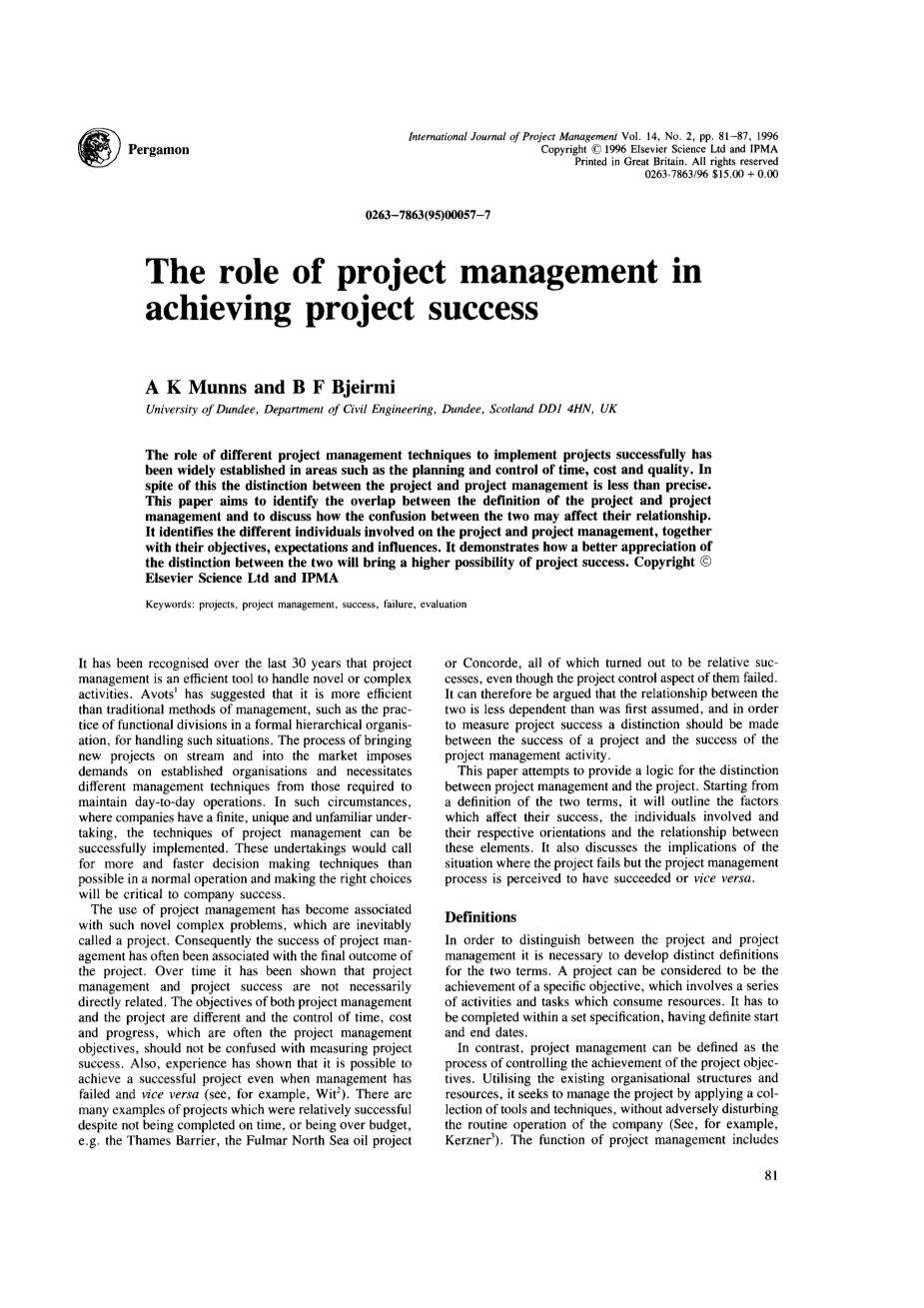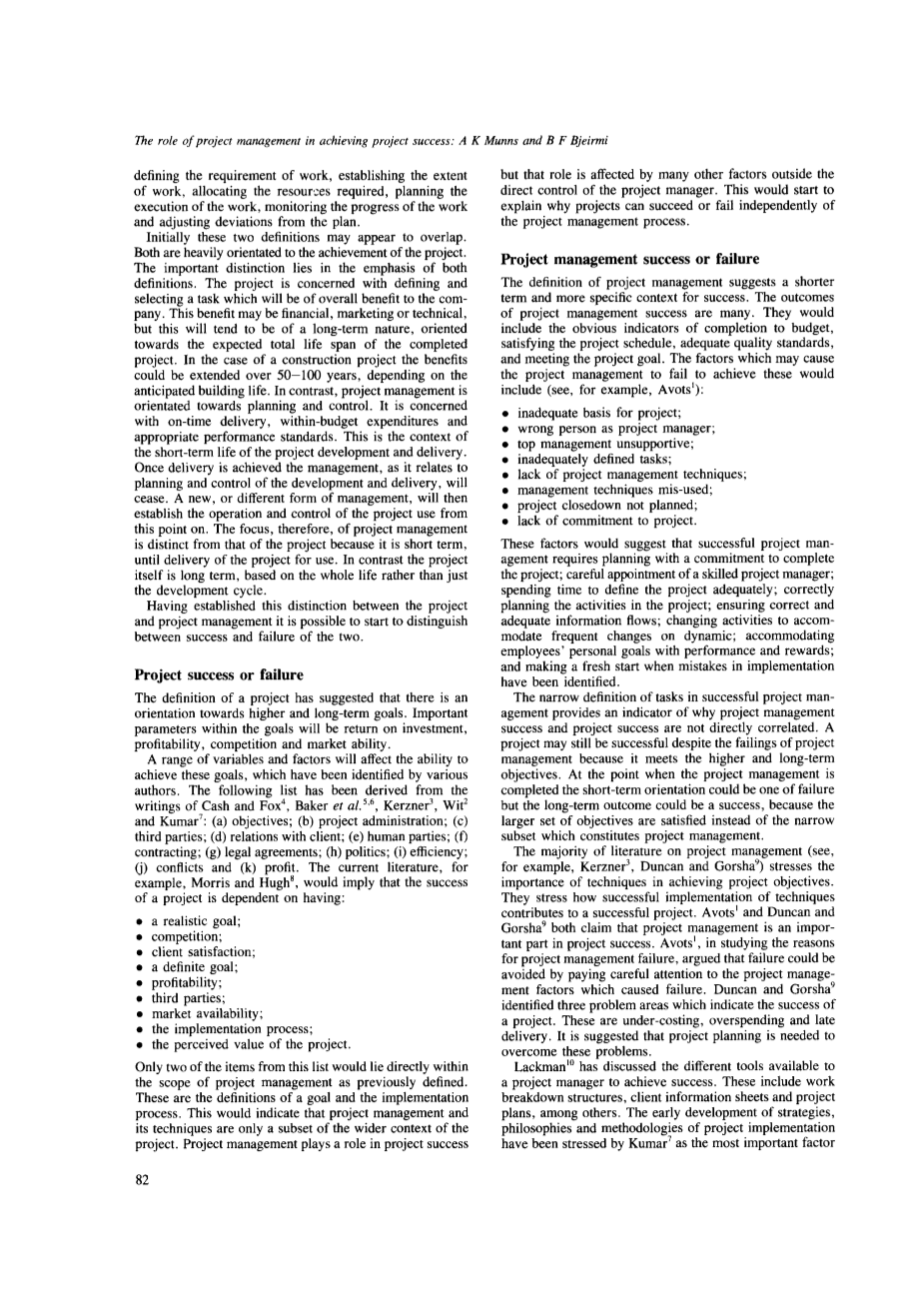英语原文共 7 页,剩余内容已隐藏,支付完成后下载完整资料
International Journal of Project Management Vol. 14, No. 2, pp, 81—87, 1996 Copyright copy; 1996 Elsevier Science Ltd and IPMA Printed in Great Britain. All rights reserved 0263-7863/96 $15.00 0.00
Pergamon
0263-7863(95)00057-7
The role of project management in achieving project success
A K Munns and B F Bjeirmi
University of Dundee, Department of Civil Engineering, Dundee, Scotland DD1 4HN, UK
The role of different project management techniques to implement projects successfully has been widely established in areas such as the planning and control of time, cost and quality. In spite of this the distinction between the project and project management is less than precise. This paper aims to identify the overlap between the definition of the project and project management and to discuss how the confusion between the two may affect their relationship. It identifies the different individuals involved on the project and project management, together with their objectives, expectations and influences. It demonstrates how a better appreciation of the distinction between the two will bring a higher possibility of project success. Copyright copy; Elsevier Science Ltd and IPMA
Keywords: projects, project management, success, failure, evaluation
It has been recognised over the last 30 years that project management is an efficient tool to handle novel or complex activities. Avots1 has suggested that it is more efficient than traditional methods of management, such as the practice of functional divisions in a formal hierarchical organisation, for handling such situations. The process of bringing new projects on stream and into the market imposes demands on established organisations and necessitates different management techniques from those required to maintain day-to-day operations. In such circumstances, where companies have a finite, unique and unfamiliar undertaking, the techniques of project management can be successfully implemented. These undertakings would call for more and faster decision making techniques than possible in a normal operation and making the right choices will be critical to company success.
The use of project management has become associated with such novel complex problems, which are inevitably called a project. Consequently the success of project management has often been associated with the final outcome of the project. Over time it has been shown that project management and project success are not necessarily directly related. The objectives of both project management and the project are different and the control of time, cost and progress, which are often the project management objectives, should not be confused with measuring project success. Also, experience has shown that it is possible to achieve a successful project even when management has failed and vice versa (see, for example, Wit2). There are many examples of projects which were relatively successful despite not being completed on time, or being over budget, e.g. the Thames Barrier, the Fulmar North Sea oil project or Concorde, all of which turned out to be relative successes, even though the project control aspect of them failed. It can therefore be argued that the relationship between the two is less dependent than was first assumed, and in order to measure project success a distinction should be made between the success of a project and the success of the project management activity.
This paper attempts to provide a logic for the distinction between project management and the project. Starting from a definition of the two terms, it will outline the factors which affect their success, the individuals involved and their respective orientations and the relationship between these elements. It also discusses the implications of the situation where the project fails but the project management process is perceived to have succeeded or vice versa.
Definitions
In order to distinguish between the project and project management it is necessary to develop distinct definitions for the two terms. A project can be considered to be the achievement of a specific objective, which involves a series of activities and tasks which consume resources. It has to be completed within a set specification, having definite start and end dates.
In contrast, project management can be defined as the process of controlling the achievement of the project objectives. Utilising the existing organisational structures and resources, it seeks to manage the project by applying a collection of tools and techniques, without adversely disturbing the routine operation of the company (See, for example, Kerzner3). The function of project management includes defining the requirement of work, establishing the extent of work, allocating the resources required, planning the execution of the work, monitoring the progress of the work and adjusting deviations from the plan.
Initially these two definitions may appear to overlap. Both are heavily orientated to the achievement of the project. The important distinction lies in the emphasis of both definitions. The project is concerned with defining and selecting a task which will be of overall benefit to the company. This benefit may be financial, marketing or technical, but this will tend to be of a long-term nature, oriented towards the expected total life span of the completed project. In the case of a construction project the benefits could be extended over 50—100 years, depending on the anticipated building life. In contrast, project management is orientated towards planning and control. It is concerned with on-time del
剩余内容已隐藏,支付完成后下载完整资料
资料编号:[424719],资料为PDF文档或Word文档,PDF文档可免费转换为Word
以上是毕业论文外文翻译,课题毕业论文、任务书、文献综述、开题报告、程序设计、图纸设计等资料可联系客服协助查找。




